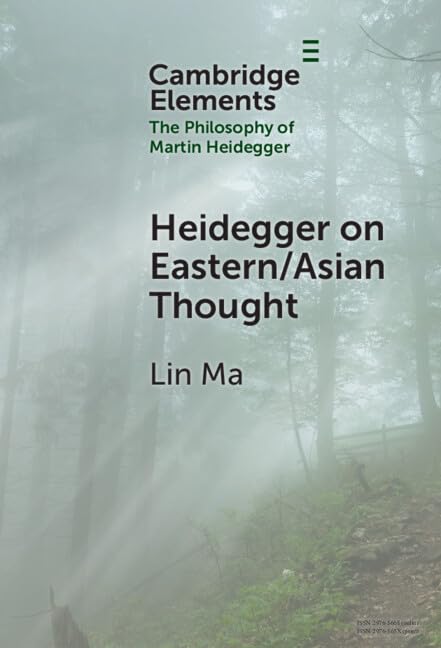
Heidegger on Eastern/Asian Thought
Lin Ma
Publisher
Cambridge University Press
Publication Date
10/24/2024
ISBN
9781009536738
Pages
92
Categories
Questions & Answers
Martin Heidegger's perspective on Eastern/Asian thought evolved significantly throughout his career, initially marked by resistance and opposition, to a more nuanced engagement. Initially, Heidegger dismissed Eastern influences on Western philosophy, viewing them as superficial or irrelevant. However, his exposure to various Eastern traditions, including Islamic philosophy, Greek thought, and Russian spirituality, influenced his thinking.
In the 1930s, Heidegger engaged with the "Asiatic" as a source of ontological power, drawing on Nietzsche's distinction between the Dionysian Greeks and the Asiatic barbarians. This period saw a focus on the early Greeks' encounter with the Asiatic, particularly Persian thought, and the potential for a "Beyng-historical" confrontation.
After World War II, Heidegger's perspective shifted, influenced by Hölderlin's thinking and his own experiences. He began to view Eastern traditions, particularly Russian spirituality and the Zhuangzi, as sources of potential for the West. This evolution was influenced by his growing concern with the "Gestell" and the need for a different philosophical orientation. Heidegger's vacillation between the Occidental and Oriental lines reflects his ongoing struggle to integrate Eastern thought into his philosophical framework.
Heidegger's philosophical engagement with Eastern/Asian thought is multifaceted and reflects his broader concerns about the essence of Being and the fate of the West. Key aspects include:
-
Near Eastern Traditions and Islamic Philosophy: Heidegger's familiarity with Islamic philosophy, particularly its influence on Aristotelian philosophy, highlights his interest in the origins and distortions of Western thought.
-
Alien Cultures and Dasein: Heidegger's discussions of 'primitive' and 'mythical' Dasein, and his critique of alien cultures, reflect his concern with the authenticity of historicality and the need to return to the essence of Being.
-
Early Greeks and the Asiatic: Heidegger's exploration of the Greeks' encounter with the Asiatic, particularly through the lens of Nietzsche, underscores his interest in the ontological power of destruction and creation.
-
Russianism: His reflections on Russianism and its spirituality indicate his search for a potential rebirth of metaphysics in the East, particularly in Russia.
-
Zhuangzi: Heidegger's engagement with the Zhuangzi suggests a move towards a more holistic understanding of Being, influenced by Eastern thought.
These aspects reflect Heidegger's broader philosophical concerns, including the search for the origins of philosophy, the critique of metaphysics, and the exploration of alternative ways of thinking about Being and the human condition.
Heidegger's engagement with Eastern/Asian thought is deeply intertwined with his concepts of 'Being' (Sein) and 'Beyng' (Seyn). Initially, his understanding of 'Being' was rooted in the Greek origin of Western philosophy, which he believed had lost its essence through medieval philosophy and ontotheology. This led him to view Eastern thought, particularly Islamic philosophy, as a distortion of the Greek origin of philosophy.
However, his later concept of 'Beyng' opened up a nonmetaphysical perspective that allowed for a more nuanced engagement with Eastern thought. He saw the potential for a new inception of Western philosophy in the East, particularly through Russianism and the Zhuangzi. This shift revealed Heidegger's recognition of the distinctness and potential of Eastern philosophies, suggesting a possibility for a genuine dialogue between Western and Eastern philosophies. Despite this, Heidegger remained cautious, emphasizing the need for Western thinking to first transform itself from its own roots before engaging in dialogue with Eastern philosophies. This indicates his complex understanding of the relationship between Western and Eastern philosophies, acknowledging their differences while seeking potential points of convergence.
Heidegger's engagement with Eastern/Asian thought significantly influenced his understanding of the 'other' and the role of dialogue in philosophy. Initially, Heidegger's approach was often confrontational, reflecting a resistance to what he perceived as the homogenizing tendencies of Western thought. His early work, particularly in "Being and Time," exhibited a skepticism towards the methodologies of synthesis and the incorporation of alien cultures, which he believed obscured the authentic understanding of Dasein.
However, as Heidegger's thought evolved, his engagement with Eastern thought, including Islamic philosophy, Russianism, and the Zhuangzi, led to a more nuanced perspective. He began to appreciate the depth and complexity of Eastern traditions, recognizing their potential to challenge and enrich Western philosophy. This shift allowed him to envision a more open and dialogical approach to philosophy, where the 'other' could contribute to a deeper understanding of Being and Beyng.
Heidegger's later work, such as "Sojourns," reflects a more collaborative engagement with the 'other,' emphasizing the importance of a mindful retrospective on the history of philosophy and the need for a genuine dialogue between East and West. This engagement with Eastern thought ultimately led Heidegger to reconsider the role of dialogue in philosophy, advocating for a more inclusive and comparative approach that acknowledges the diverse origins and contributions of philosophical traditions.
The book contributes to the debate by providing a comprehensive analysis of Heidegger's engagement with Eastern/Asian thought, revealing his complex and evolving stance. It highlights how Heidegger's understanding of 'East' encompasses various traditions, including Near Eastern, Greek, Russian, and East Asian, and how these influenced his philosophy. The book challenges the notion that Heidegger's engagement with Eastern thought was superficial or limited to East Asia, demonstrating its broader scope.
However, the limitations of Heidegger's approach include his tendency to essentialize and dichotomize Eastern and Western thought, often reducing them to simplistic stereotypes. Heidegger's focus on the Greek origin of Western philosophy and his dismissal of Eastern influences as secondary or superficial can be seen as Eurocentric. Additionally, his engagement with Eastern thought often lacks a nuanced understanding of the complexities within these traditions, potentially leading to misinterpretations.